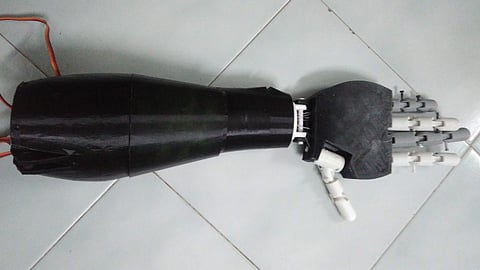

There are more than one million amputations that occur every year - something like one every 30 seconds. The number of amputees is increasing but only a privileged few can afford prosthetic limbs. That's why the new 3D printed prosthetic limbs designed by the Biomedical Engineering department at SSN College, Chennai could be a gamechanger. Four students have designed a prosthetic hand that looks and feels like a prosthetic but is remote-controlled. Dr A Kavitha, Professor and Head, Department of Biomedical Engineering and R Nithya, Assistant Professor, Department of Biomedical Engineering at the SSN Institutions along with their students - Vaishalini Venkatraman, Rathi Adarshi R, Santhana Lakshmi A and Shuruthi Sree R, completed this project successfully.
Prosthetic Limbs that are currently in the market are extremely expensive, heavy and don't provide enough degree of freedom or movement. These 3D printed prosthetic limbs solve all these problems also making the device available for a hundredth of the cost. How? By using recycled plastic materials. A Canadian social enterprise called RECYCL3D collaborated with SSN to develop 3D printed prosthetic limbs with recycled materials. The device has already been receiving a lot of praise from the Research Advisory Council, universities across the world and many other organisations. "Our next project is to develop a prosthetic limb that can be moved through internal control mechanism," Kavita said.
Because they will be using recyclable materials, the 'hand' will be environment-friendly and lighter in weight. Kavitha said that the current devices cost hundred times more than the new ones which could be priced between 65,000 rupees and one lakh rupees. The prosthetics can be designed depending on the requirements of every patient, Kavitha said. "The product has been designed and submitted for approval. It should hit the shelves in two months," she added.
